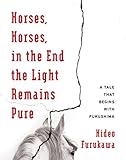Horses, Horses, in the End the Light Remains Pure : A Tale That Begins with Fukushima / Hideo Furukawa.
Material type: TextSeries: Weatherhead Books on AsiaPublisher: New York, NY : Columbia University Press, [2016]Copyright date: ©2016Description: 1 online resource (160 p.)Content type:
TextSeries: Weatherhead Books on AsiaPublisher: New York, NY : Columbia University Press, [2016]Copyright date: ©2016Description: 1 online resource (160 p.)Content type: - 9780231178686
- 9780231542050
- 895.636 23
- PL870.R85 U4313 2016
- online - DeGruyter
| Item type | Current library | Call number | URL | Status | Notes | Barcode | |
|---|---|---|---|---|---|---|---|
 eBook
eBook
|
Biblioteca "Angelicum" Pont. Univ. S.Tommaso d'Aquino Nuvola online | online - DeGruyter (Browse shelf(Opens below)) | Online access | Not for loan (Accesso limitato) | Accesso per gli utenti autorizzati / Access for authorized users | (dgr)9780231542050 |
Browsing Biblioteca "Angelicum" Pont. Univ. S.Tommaso d'Aquino shelves, Shelving location: Nuvola online Close shelf browser (Hides shelf browser)

|

|

|

|

|

|

|
||
| online - DeGruyter Too Little, Too Late : The Quest to Resolve Sovereign Debt Crises / | online - DeGruyter In Search of the Lost Orient : An Interview / | online - DeGruyter The Gnostic New Age : How a Countercultural Spirituality Revolutionized Religion from Antiquity to Today / | online - DeGruyter Horses, Horses, in the End the Light Remains Pure : A Tale That Begins with Fukushima / | online - DeGruyter Love in the Dark : Philosophy by Another Name / | online - DeGruyter Friendship Reconsidered : What It Means and How It Matters to Politics / | online - DeGruyter Negotiating Languages : Urdu, Hindi, and the Definition of Modern South Asia / |
Frontmatter -- Contents -- Horses, Horses, in the End the Light Remains Pure -- Translator’s Afterword -- Translator’s Acknowledgments -- Backmatter
restricted access online access with authorization star
http://purl.org/coar/access_right/c_16ec
"As we passed from the city center into the Fukushima suburbs I surveyed the landscape for surgical face masks. I wanted to see in what ratios people were wearing such masks. I was trying to determine, consciously and unconsciously, what people do in response. So, among people walking along the roadway, and people on motorbikes, I saw no one with masks. Even among the official crossing guards outfitted with yellow flags and banners, none. All showed bright and calm. What was I hoping for exactly? The guilty conscience again. But then it was time for school to start. We began to see groups of kids on their way to school. They were wearing masks."Horses, Horses, in the End the Light Remains Pure is a multifaceted literary response to the earthquake, tsunami, and nuclear meltdown that devastated northeast Japan on March 11, 2011. The novel is narrated by Hideo Furukawa, who travels back to his childhood home near Fukushima after 3/11 to reconnect with a place that is now doubly alien. His ruminations conjure the region's storied past, particularly its thousand-year history of horses, humans, and the struggle with a rugged terrain. Standing in the morning light, these horses also tell their stories, heightening the sense of liberation, chaos, and loss that accompanies Furukawa's rich recollections. A fusion of fiction, history, and memoir, this book plays with form and feeling in ways reminiscent of Vladimir Nabokov's Speak, Memory and W. G. Sebald's The Rings of Saturn yet draws its own, unforgettable portrait of personal and cultural dislocation.
Mode of access: Internet via World Wide Web.
In English.
Description based on online resource; title from PDF title page (publisher's Web site, viewed 25. Jun 2024)


